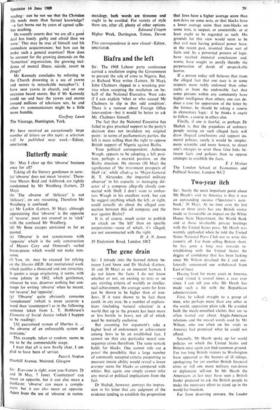Biafra and the left
Sir: The 1968 Labour party conference carried a resolution urging the Government to prevent the sale of arms to Nigeria. But, as Richard West writes (Letters, 30 May), John Chalmers slipped in a wrecking pro- viso when accepting the resolution on be- half of the National Executive. West asks if I can explain 'what or who caused Mr Chalmers to slip in this odd condition'. There is a rumour about Foreign Office intervention—but it would be better to ask Mr. Chalmers himself.
The fact that the National Executive has failed to give practical support to the party's decision does not invalidate my original point: in terms of parliamentary parties. the left is more willing than the right to oppose British support of Nigeria against Biafra.
Your political correspondent, Auberon Waugh. appears to be adopting a left posi- tion, perhaps a marxist position, on the Biafra situation. He stresses (30 May) the significance of 'the investment prospects of Shell we, while alluding to 'Major-General H. T. Alexander. the impartial military observer' in his capacity as managing dir- ector of a company allegedly closely con- nected with Shell. I don't want to embar- rass Waugh in his excellent work, but can he suggest anything which the left, or right, could actually do about the alleged con- nection between this oil company and the war against Biafra?
It is, of course, much easier to publish an attack on 'the left' than on specific corporations—some of which, it's alleged, are not unconnected with the right.


































 Previous page
Previous page